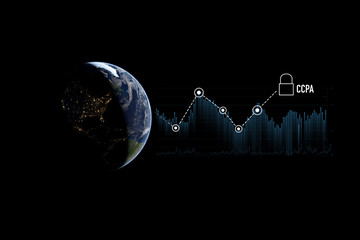Why the California Consumer Privacy Act Matters for Businesses?

California has long been a trendsetter in the United States, and the passage of the California Consumer Privacy Act or CCPA is no exception. The CCPA is considered one of the country’s most comprehensive data privacy laws, and this law has a significant impact on businesses operating in California – or doing business with Californians. If you’re not already familiar with the CCPA, now is the time to learn what it means for your business. Read on to get an overview of the CCPA and discuss how it will affect businesses in California and beyond.
What is the CCPA?
The CCPA is a new data privacy law that was passed in 2018 and went into effect on January 1, 2020. The CCPA gives Californians more control over their personal data and holds businesses accountable for protecting that data. Under the CCPA, businesses need to disclose what personal data they collect, why they collect it, and with whom they share it. Consumers also have the right to request that their personal data be deleted, and businesses are prohibited from selling the personal data of consumers under the age of 16 without explicit consent.
The CCPA applies to businesses that meet one or more of the following criteria:
– Have annual gross revenues in excess of $25 million
– Collect, buy, sell, or share the personal data of 50,000 or more consumers, households, or devices
– Derive 50 per cent or more of their annual revenue from selling consumers’ personal data
If your business meets any of the above criteria, you must comply with the CCPA. Failure to comply with the law could result in hefty fines, so it’s important to make sure you study CCPA and understand your obligations under the CCPA in order to take steps to ensure compliance.
How does the CCPA affect businesses?
The CCPA has several impacts on businesses, both in California and beyond. Perhaps the most significant impact is the requirement to disclose what personal data is being collected and why. This transparency obligation is something that many consumers have been calling for, and it requires businesses to re-evaluate their data collection practices. In addition, the CCPA gives consumers the right to request that their personal data be deleted, and businesses need to have a process in place for responding to these requests.
The CCPA will also affect businesses that sell personal data. Under the law, businesses are prohibited from selling consumers’ personal data under the age of 16 without explicit consent. This means that businesses need to put in place age verification mechanisms to ensure they are only selling the personal data of consumers who have given their consent.
Finally, the CCPA imposes new obligations on businesses with respect to data security. Businesses need to take reasonable steps to protect the personal data they collect from unauthorized access, destruction, or use. This includes implementing physical, technical, and administrative safeguards to protect personal data.
How can businesses prepare for the CCPA?
If your business/company is subject to the CCPA, there are a certain steps you can take to ensure compliance. First, review your data collection practices and ensure you are only collecting the personal data necessary for your business purposes. You should also develop a process for responding to consumer requests to delete their personal data. This process should be designed to ensure that all requests are handled promptly and correctly.
In addition, you should establish age verification mechanisms if you sell personal data. These mechanisms will help you ensure that you are only selling the personal data of consumers who have given their consent. Finally, ensure you have adequate security measures to protect the personal data you collect from unauthorized access, destruction, or use.